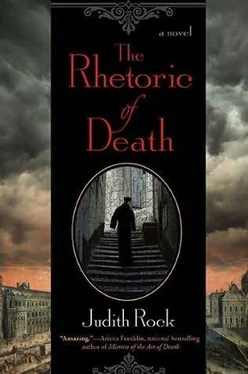Judith Rock - The Rhetoric of Death
Здесь есть возможность читать онлайн «Judith Rock - The Rhetoric of Death» весь текст электронной книги совершенно бесплатно (целиком полную версию без сокращений). В некоторых случаях можно слушать аудио, скачать через торрент в формате fb2 и присутствует краткое содержание. Жанр: Исторический детектив, на английском языке. Описание произведения, (предисловие) а так же отзывы посетителей доступны на портале библиотеки ЛибКат.
- Название:The Rhetoric of Death
- Автор:
- Жанр:
- Год:неизвестен
- ISBN:нет данных
- Рейтинг книги:3 / 5. Голосов: 1
-
Избранное:Добавить в избранное
- Отзывы:
-
Ваша оценка:
- 60
- 1
- 2
- 3
- 4
- 5
The Rhetoric of Death: краткое содержание, описание и аннотация
Предлагаем к чтению аннотацию, описание, краткое содержание или предисловие (зависит от того, что написал сам автор книги «The Rhetoric of Death»). Если вы не нашли необходимую информацию о книге — напишите в комментариях, мы постараемся отыскать её.
The Rhetoric of Death — читать онлайн бесплатно полную книгу (весь текст) целиком
Ниже представлен текст книги, разбитый по страницам. Система сохранения места последней прочитанной страницы, позволяет с удобством читать онлайн бесплатно книгу «The Rhetoric of Death», без необходимости каждый раз заново искать на чём Вы остановились. Поставьте закладку, и сможете в любой момент перейти на страницу, на которой закончили чтение.
Интервал:
Закладка:
His nose led him to a swarthy man in a purple turban and flowing scarlet robe, sitting cross-legged on a patterned rug. Beside him, coffee simmered in a brass pot on a little stove. Charles nodded politely, wondering how to address a Mahometan. The coffee seller cocked a bright brown eye at him, poured coffee into a pottery bowl, and held it out.
“Coffee of the best, mon pere, and cheap,” he said, revealing himself as Parisian to the bone. “Wakes up the brain, pours heat into the sinews, balances the fluids, practically writes your sermons for you!”
Charles reached recklessly under his cassock and fished money out of his purse. The “Mahometan” whipped the coins from his palm and handed him the bowl. Charles sipped, half repelled by the bitterness, half intoxicated by the smell. And oddly pleased by the buzzing feeling that grew in his head as he drank. Before he knew it, the bowl was empty. Regretfully, he gave it back, refused a refill, and continued on in search of sugar. The buzzing feeling grew as he walked along the aisle between the stalls. Colors seemed twice as bright and he felt like he could walk to Turkey for a coffee tree and be back before dinner.
A splash of glowing red on a grocer’s stall stopped him in front of a basket of tomatoes. Tomatoes were common at home, but less so here, it seemed. None had appeared so far on the college table. Charles found himself smiling as he drank in their glowing color, remembering that some people still shunned them as the fruit Eve had given Adam, and what Pernelle had had to say about that. “Well, he didn’t have to eat it, did he?” she would say, her black eyes snapping. “But, of course, women are always blamed when things go wrong for a man.”
“Oh, look, let’s get some,” the same rich alto voice went on. Charles froze. Could coffee make him hear voices that weren’t there?
“Never, child!” an older voice hissed. “They’re love apples, they’re poisonous, everyone knows that. It’s a sin to sell them!”
Very slowly, Charles turned his head. The girl with Pernelle’s voice was pretty. But her hair was only brown, not a cloud of midnight. And when she felt Charles’s stare and turned to smile at him from under her little cherry ribboned parasol, he saw that her eyes were only brown instead of sparkling onyx.
“Bonjour, mon pere,” she said demurely, dimpling at his admiration.
He sketched a hasty blessing on the air and moved away to gaze fixedly at a length of badly dyed tawny wool on the next stall. Laughing, the girl called a bold good-bye as her chaperone hurried her away. Blind to the wool’s garish color and deaf to the seller’s praise for its quality, Charles was seized with longing for news of Pernelle, if she was well, if she liked Geneva, if David’s family was kind to her. He closed his eyes, prayed for her, and then walked on, earning a muttered curse from the disappointed cloth merchant. And another curse when he reversed direction and passed by the stall again without stopping. He’d been so unnerved by the girl, he’d hardly registered the snowy sugar sparkling on a stall beyond the love apples.
He chose two large cone-shaped loaves and paid for them with Jouvancy’s coins. As the grocer wrapped them, the tower clock chimed from the old Conciergerie palace. If he kept his mind on business, he still had enough time to look for the street porter with the broken nose. He stowed the sugar in Jouvancy’s leather bag and started down the quay that bordered the market, heading west toward the tip of the island. He soon found the sort of scene he wanted. Heavily wrapped bolts of cloth, rounds of cheese, and boxes smelling of cinnamon were being unloaded from a barge and a small boat, and a dozen or so porters were securing bundles to the tall carrying frames they wore on their backs. Charles walked slowly among them, but none had the nose he was looking for. He reached the quay’s end without finding the man and retraced his steps toward the Petit Pont, still looking, but with no success. As he came to the bridge, the tower clock struck the quarter before ten, sending him at a trot across the river, where he went down the slope and along the left bank, seeing plenty of porters, but never the one he sought. He was below the Quay des Augustins, passing small fishing boats with planks laid so that customers could come from the bank and buy, when he collided with a woman stepping off a plank bridge with a basket of eels. The eels went flying and the woman rained abuse on him as he helped her gather their tangled slipperiness back into the basket. He straightened and nearly upended the basket again as he came face-to-face with the man who was trying to step around him.
“Monsieur, thank God!” He pulled the startled and protesting porter to the side of the quay. “Please, monsieur, I must talk with you. About the accident you saw on the rue des Poirees, the little boy-”
“No!” Breathing heavily through his mouth, the porter wrenched his arm away. “Leave me alone!” His long bony face had gone the color of a fish belly. “I told the other one. You’ve no call to hound me!”
His fingers twisted in the old sign to ward off evil and he tore himself out of Charles’s grip and ran, the empty frame bouncing on his long back. Charles started after him, but someone jerked him back by his cassock and spun him around.
“Leave him alone, priest!” His captor had a voice like gravel caught in a sieve, and the face that went with the voice was as expressionless as a wall. He was big in every direction and his four confreres were built like the squat, sturdy pillars in a Norman church. The five men closed around Charles.
“I swear by the Virgin, messieurs, I mean him no harm,” Charles said. “I only want-”
“Are you deaf?” Gravel Voice said, shaking him. “I said leave off. If we cut away the flapping part of your ears, maybe you’d hear better. But there’s no sport with your kind. No fight.”
The others laughed and Charles breathed onion, garlic, and the stink of sweat. “No, not now,” he said evenly, “I swore off fighting a long time ago.”
“What would you know of fighting?”
“Enough, after two years in the king’s army.”
“Where?” the shortest man said skeptically.
“The Spanish Netherlands in ’77, for one place. St. Omer.”
“You, too?” The short man’s eyes lit with interest and he stepped closer and peered up at Charles. “Me, I was there, too, I carried a pike.”
“I was a mousquetaire,” Charles said.
Gravel Voice spat close to Charles’s feet. “Why the skirt, then?”
“I was wounded. I had a lot of time to think and decided I didn’t like killing people.”
“Me, I was wounded, too.” The ex-soldier pulled up his patched jacket and showed a jagged scar running the length of his forearm. “But I never thought of being a cleric.”
“That randy woman of yours would beat you into a pate if you did,” someone laughed.
“What do you want with Pierre, then, mon pere?” the ex-soldier said.
“I teach at the college of Louis le Grand, and a few days ago, he saw a little boy from our school ridden down on the rue des Poirees. I just want to hear from him what happened. Only that. He was in no way to blame, he is in no trouble. I would be very grateful and will certainly reward him for telling me what he saw.”
The man’s eyes narrowed suspiciously. “Why?”
“The boy’s father is anxious to know all he can about what happened.”
Most of the men grunted, understanding that.
“Would you tell your friend Pierre what I say? And tell him, too”-Charles hesitated, unsure how to put it-“tell him I am not a friend of the other priest who talked to him.”
“Good enough for me,” the ex-soldier said, ignoring Gravel Voice’s protest. “Come back here first thing tomorrow.” He pointed across the Seine at the Louvre palace. “You sound foreign, there’s your landmark, if you need it. If Pierre wants to talk, he’ll be here.”
Читать дальшеИнтервал:
Закладка:
Похожие книги на «The Rhetoric of Death»
Представляем Вашему вниманию похожие книги на «The Rhetoric of Death» списком для выбора. Мы отобрали схожую по названию и смыслу литературу в надежде предоставить читателям больше вариантов отыскать новые, интересные, ещё непрочитанные произведения.
Обсуждение, отзывы о книге «The Rhetoric of Death» и просто собственные мнения читателей. Оставьте ваши комментарии, напишите, что Вы думаете о произведении, его смысле или главных героях. Укажите что конкретно понравилось, а что нет, и почему Вы так считаете.












